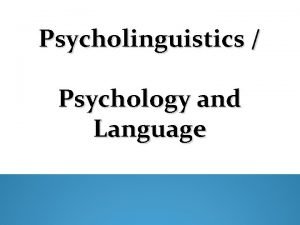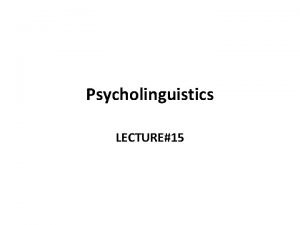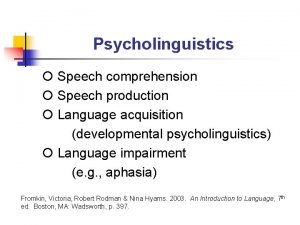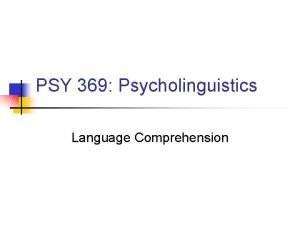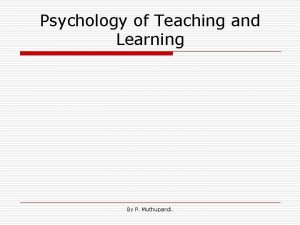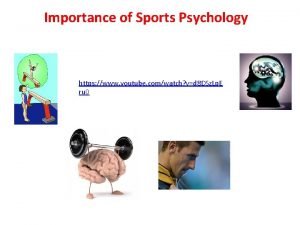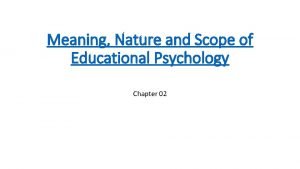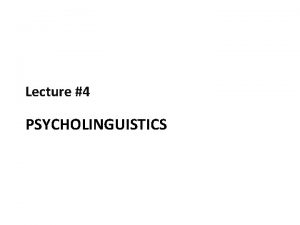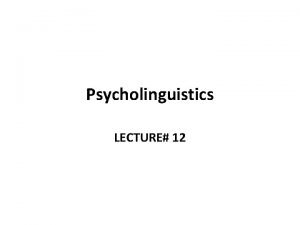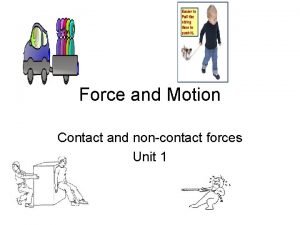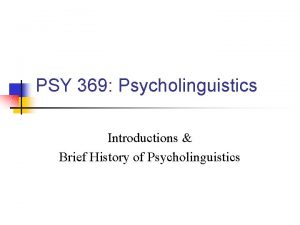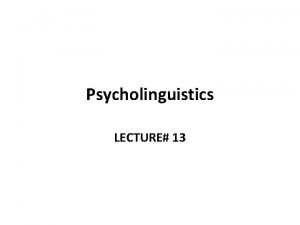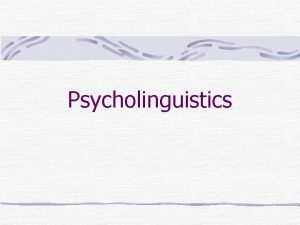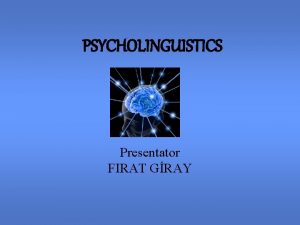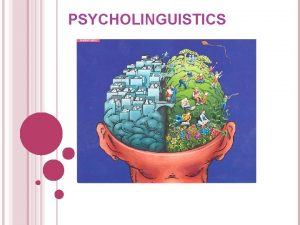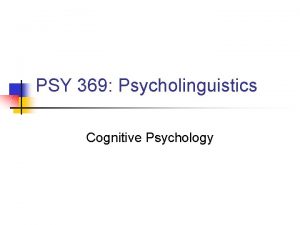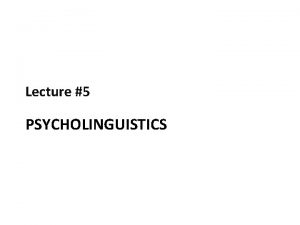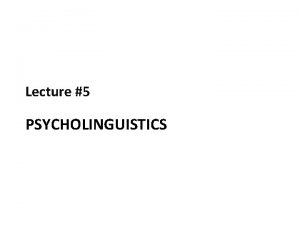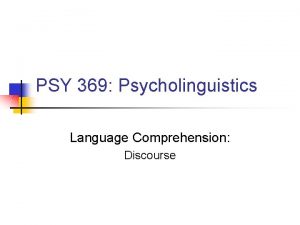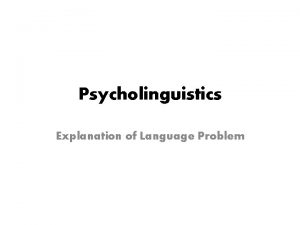Psycholinguistics Psychology and Language 1 Some Important Definitions












- Slides: 12

Psycholinguistics / Psychology and Language

. 1 Some Important Definitions Psychology is both an academic and applied discipline involving the scientific study of mental processes or mental functions ( such as perception, introspection, memory , creativity, imagination , conception , belief , reasoning , volition, and emotion — in other words, all the different things that we can do with our minds) and behaviour ( the actions or reactions of an object or organism, usually in relation to the environment; which can be conscious or unconscious, overt or covert, and voluntary or involuntary ).

Psychologists study such phenomena as perception, cognition, emotion, personality, behaviour, and interpersonal relationships. Psychology also refers to the application of such knowledge to various spheres of human activity, including issues related to daily life—e. g. family, education, and work—and the treatment of mental health problems.

The social science branch of psychology (mainly social psychology) attempts to understand the role human behavior plays in social dynamics (e. g. , culture, economics, and politics). Although the natural science branch of psychology differs from biology which is the branch of science that studies life. . This broad spectrum of empirical fields studies (Empirical data is data that is produced by experiment or observation ) and classifies living organisms and biological phenomena and neuroscience (a field that is devoted to the scientific study of the nervous system Such studies may include the structure, function, evolutionary history, development, genetics, biochemistry, physiology, pharmacology, and pathology of the nervous system. )

Psychological science has a long tradition of incorporating physiological and neurological processes into its conceptions of mental functioning. Psychology includes many sub-fields of study and application concerned with such areas as human development, sports, health, industry, forensics, and spirituality. As such, psychology is not a unified scientific discipline, with many different perceptions of what the field entails, and many different standards of what constitutes scientific research.

Definition of Psycholinguistics is the study of the psychological and neurobiological factors ( the study of cells of the nervous system and the organization of these cells into functional circuits that process information and mediate behavior. ) that enable humans to acquire, use, and understand language. Initial attempts to study psycholinguistics were largely philosophical ventures, due mainly to a lack of cohesive data on how the human brain functioned. or psychology of language Modern research makes use of biology, neuroscience , cognitive science, and information theory to study how the brain processes language. There a number of subdisciplines; for example, as non-invasive techniques for studying the neurological workings of the brain become more and more widespread, neurolinguistics ( the science concerned with the human brain mechanisms underlying the comprehension, production and abstract knowledge of language, be it spoken, signed (body language) or written. )has become a field in its own right.

Psycholinguistics covers the cognitive processes that make it possible to generate a grammatical and meaningful sentence out of vocabulary and grammatical structures, as well as the processes that make it possible to understand utterances, words, text, etc. Developmental psycholinguistics studies infants' and children's ability to learn language, usually with experimental or at least quantitative methods (as opposed to naturalistic observations such as those made by Jean Piaget ( Swiss philosopher, natural scientist and developmental psychologist, well known for his work studying children, and for his theory of cognitive development ( in his research on the development of children).

First Language Acquisition

Language acquisition is one of the central topics in cognitive science. Every theory of cognition has tried to explain it. Possessing a language is an essential human trait: all normal humans speak, no nonhuman animal does. Language is the main vehicle by which we know about other people's thoughts, and the two must be intimately related. Every time we speak we are revealing something about language, so the facts of language structure are easy to obtain; these data hint at a system of extraordinary complexity. Nonetheless, learning a first language is something every child does successfully in a matter of a few years and without the need formal lessons. Language acquisition takes place mainly before the age of 5 years old. No child fails to learn a language (pathologies aside); and language acquisition is carried out in much the same way.

In acquiring language, the child’s linguistic knowledge passes through stages; each stage resembles the adult’s linguistic knowledge until the child gains full competence. Children do not acquire their mother tongue by memorisation and repetition of sentences they hear in their immediate environment.

Quite the reverse, children are continuously involved in the creative activity of constructing and comprehending new sentences which they have never experienced before. In fact what they do is building a grammar of the language they are learning, a mental system of rules and principles, a theory of their language which makes them able to produce and understand all the sentences of the language.

The very difficult task and the very short time in which it is acquired , added to the poor quality of the language material the child is exposed to ( parents , mothers in particular, sometimes even imitating child’s language ) confirm the assumption that human beings are born with the disposition to learn language. However, the role of the environment is very important. With no linguistic input- i. e. speech from the surrounding environment- to provoke the acquisition process, a child will not learn a language.
 Language
Language Language loss in psycholinguistics
Language loss in psycholinguistics Comprehension and production in language acquisition
Comprehension and production in language acquisition Comprehender adalah
Comprehender adalah Nature of psychology
Nature of psychology Youtube sports psychology
Youtube sports psychology Nature educational psychology
Nature educational psychology Scope of psycholinguistics
Scope of psycholinguistics Scope of psycholinguistics
Scope of psycholinguistics What are some contact forces and some noncontact forces?
What are some contact forces and some noncontact forces? Some trust in horses
Some trust in horses What is psycholinguistics
What is psycholinguistics History of psycholinguistics
History of psycholinguistics
